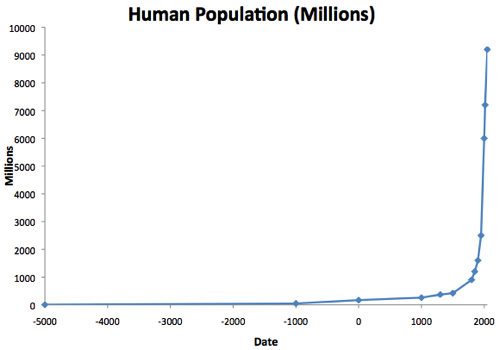Government and co-operation are in all things the Laws of Life; Anarchy and competition the Laws of Death.
John Ruskin, Unto this Last, and Other Writings 202 (Clive Wilmer, ed. Penguin Classics 2005) (1862).
Anarchy and competition are Nature.
Government and cooperation are Civilization.
One can make out the difference in the data, which describes rather nicely why the former is Death (see the part of the plot up to -2000) and the latter is Life (see the part of the plot starting from -2000, when civilization started to take off).

Ruskin also makes of regulation an axiom. He writes:
The word “righteousness” properly refers to the justice of rule, or right, as distinguished from “equity” which refers to the justice of balance. More broadly, Righteousness is King’s justice; and Equity Judge’s justice; the King guiding or ruling all, the Judge dividing or discerning between opposites (therefore, the double question, “Man, who made me a ruler . . . or a divider . . . over you?”) Thus with respect to the Justice of Choice (selection, the feebler and passive justice), we have from lego, -lex, legal, loi, and loyal; and with respect to the Justice of Rule (direction, the stronger and active justice), we have from rego, -rex, regal, roi, and royal.
John Ruskin, Unto this Last, and Other Writings 191 (Clive Wilmer, ed. Penguin Classics 2005) (1862) (emphasis mine).
To which one might append: regulation.
Thus there are two kinds of governance, that which strives only to prevent discrimination, but which otherwise is laissez faire. It is ultimately juridical in nature, directed at fairness. And then there is regulation, governance as guidance.
The implication is that good government must both equalize and guide. It must not only ensure that each member of a particular fare class has an equal chance of getting the middle seat (lex), but also command that the seat be clean, and wide, and pleasantly lit (rex).
Little wonder that a nation founded by lawyers in revolt against a king would have no concept of regulation and a burning enthusiasm for law. (That’s true across the political spectrum: the urge to “break ’em up” is bipartisan.)
The more so in light of some very bad Twentieth Century run-ins with guidance.
And yet a governance without rex does seem highly problematic, even impossible. For we do always need guidance. Here is a remarkable passage, from Lon Fuller, of all people:
When the idea of freedom from choice is introduced into a philosophic discussion it tends to carry with it overtones of morbidity, escape and totalitarianism. Yet when we encounter it in everyday life we do not view it that way; often it is welcome indeed. There is surely nothing morbid or escapist about the sense of freedom and release that a lawyer experiences when he finds a good secretary capable of taking over the hundred small decisions or choices that have to be made in managing an office and in handling routine correspondence.
There is, in fact, nothing more appalling than the thought of having to choose everything. Anyone who has read an exposition of philosophic anarchism knows what a sense of oppression comes from thinking of society’s being so organized (or unorganized) that nothing is decided in advance for the individual, so that he has to carve his own way through life without the guidance of institutions, or traditions, or legal compulsions. For the man who has to choose everything the burden of choice becomes so unbearable that choice itself loses its meaning.
The apparent contradiction between freedom to choose and freedom from choice is removed when we observe that of the two the first is primary and original, while the second is derivative and dependent for its significance on the first. Freedom from choice is meaningless if choice itself does not exist. If we feel free when we are relieved from choice, it is because we can then exercise choice in a field of our preference where we consider it important that we should decide things for ourselves.
The problem of freedom, then, is the problem of allocating choice.
Lon L. Fuller, Some Reflections on Legal and Economic Freedoms–A Review of Robert L. Hale’s Freedom through Law, 54 Colum. L. Rev. 70, 72 (1954).
The allocator, of course, is the regulator. And so there is no question whether to have rex, anymore than it is possible for each of us to choose which of a thousand components should be included in our iPhones. The inescapable question is: how to ensure that the guidance is wise?
Confucius’s reply has always sounded pretty good to me:
道 之以德、齊之以禮、有恥且格。
Confucius, Analects bk. 2 ch. 3.